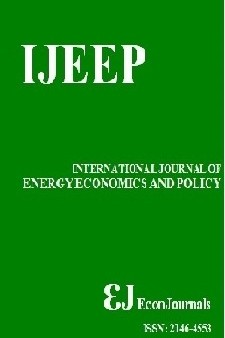Public-Private Participation in Energy Infrastructure in Middle East and North African Countries: The Role of Institutions for Renewable Energy Sources Diffusion
Public-Private Participation in Energy Infrastructure in Middle East and North African Countries: The Role of Institutions for Renewable Energy Sources Diffusion
Public Private Partnership, Investment, Middle East and North Africa, Energy Transition Institutional Endowment, Renewable Energy Sources Investment,
- Başlangıç: 2011
- Yayıncı: İlhan ÖZTÜRK
Uncertainty of Oil Proved Reserves and Economic Growth in Iran
Elaheh Asadi Mehmandosti, Fatemeh Bazzazan, Mir Hossein Mousavi
Ernesto SOMMA, Alessandro RUBİNO
A Causal Relationship between Energy Consumption, Energy Prices and Economic Growth in Africa
Farzana SHARMİN, Mohammed Robayet KHAN
Rodolfo Garcia Sierra, Alvaro Zerda Sarmiento
Munshi Naser Ibne Afzal, Jeff Gow
Lyubov Vasilievna LARCHENKO, Roman Aleksandrovich KOLESNİKOV, Galina Pavlovna TUMANOVA, Valeriy Aleksandrovich KİBENKO
Economic and Technical Feasibility of Metering and Sub-metering Systems for Heat Accounting
Luca CELENZA, Marco DELL’ISOLA, Giorgio FİCCO, Marco GRECO, Michele GRİMALDİ
Gas Flaring Effects and Revenue Made from Crude Oil in Nigeria
Nasiru YUNUSA, İsmail Tijjani IDRİS, Adamu Garba ZANGO, Muhammad Umar KİBİYA
Dana Saylauovna BEKNİYAZOVA, Arman AKİSHEV, İldar KALİYEV, Gulnara Turganovna SHAMSHUDİNOVA, Meiramgul Armiyanovna ALTYBASSAROVA
Oil Price and Exchange Rates: A Wavelet Analysis for Organisation of Oil Exporting Countries Members
Basheer H. M. Altarturi, Ahmad Alrazni Alshammri, Tuan Muhd Taufik Tuan HUSSİN, Buerhan SAİTİ
